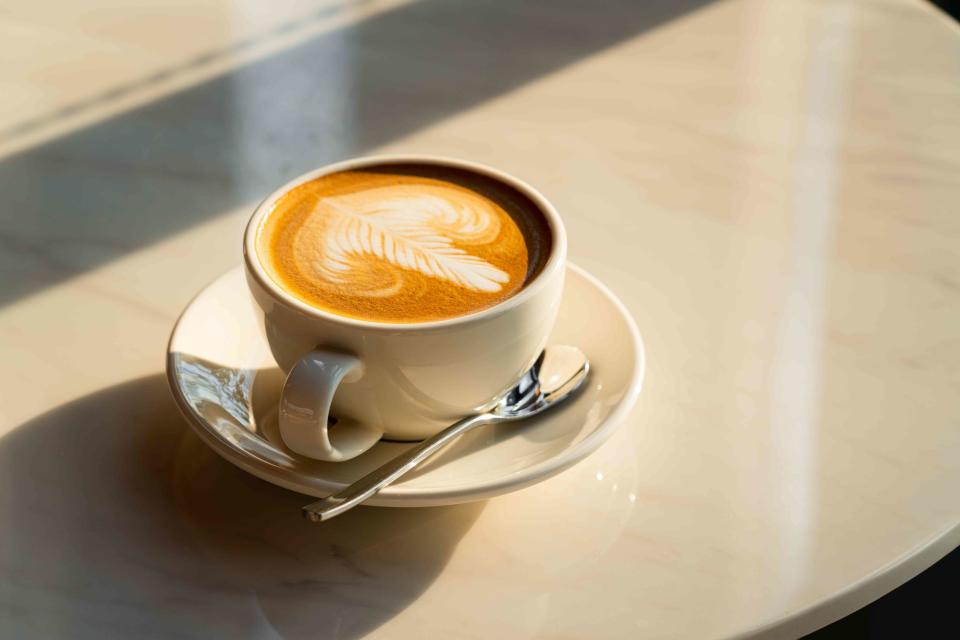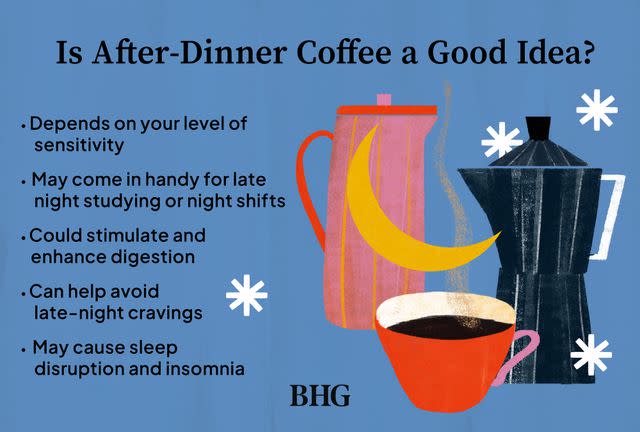The right amount of coffee can be good for you, but timing it too close to bedtime could have unwanted effects on your sleep.

No matter how you take it or when, coffee is a ritual. The smell of a freshly brewed pot of coffee is what jolts some people out of bed in the morning, while an after-lunch shot of espresso is the highlight of others’ afternoons.
But what about those who prefer the bitter beverage as an after-dinner delight? Evening coffee drinkers say the post-meal cup of joe helps with digestion, and is a zero-calorie alternative to dessert. Still, we can’t ignore coffee’s caffeine content, which has the potential to disrupt sleep. From experts, here’s all you need to know about drinking coffee after dinner.
Related: These 10 Coffee Makers and Espresso Machines Are the Best Way to Start Your Morning

Even Late in the Day, Coffee Has Its Perks
A moderate amount of coffee is good for you. According to the Cleveland Clinic, coffee contains nutrients and antioxidants, and it may even reduce the risk of some diseases. The key word here is “moderate”—the FDA recommends an upper limit of 400 milligrams of caffeine daily, which is about four or five cups of coffee.
One of coffee’s most well-known benefits is its ability to increase alertness, reaction time, and mental performance. This may come in handy for college students cramming the night before a big exam, or for people who work the graveyard shift.
Proponents of post-dinner coffee to aid with digestion may also be onto something.
“Generally speaking, drinking coffee immediately after dinner will likely stimulate and enhance digestion,” says dietitian Jenna Volpe, R.D.N. “This is usually for the better in most people, with the exception being people who have an underlying medical condition that makes them more prone to diarrhea.”
Anecdotally, coffee may help you avoid late-night cravings. Some view the hot beverage as a low-calorie swap for sugar-laden desserts. But, speaking of sugar, coffee additives can move the pendulum. Adding milk to your coffee could induce sleepiness since milk is a source of tryptophan, which could promote good sleep quality.
Related: This Is the Secret to Enjoying an Evening Espresso Martini
Late-Night Coffee Can Also Keep You Up at Night
Evening coffee may have some benefits, but do they outweigh the costs? When it comes to coffee at night, it could negatively impact one of the most important aspects of health—your sleep.
“Caffeine can raise cortisol, even among those who drink it regularly,” Volpe says. “Cortisol is a stress hormone which can often make anxiety and insomnia worse from increased stress hormones circulating in the bloodstream.” Stress and sleep have never really mixed.
The caffeine in coffee also often blocks tiredness, which is why it’s an effective solution for early morning drowsiness. It promotes alertness by blocking a sleep-promoting substance, and it does so quickly, according to the American Academy of Sleep Medicine. The jolt of alertness is welcomed in the morning, but isn’t ideal when it’s time to wind down and get some rest.
Studies also show that consuming caffeine close to bedtime interferes with healthy sleep.
“Caffeine taken at bedtime and even within six hours prior to bedtime significantly disrupts sleep,” says sleep medicine doctor Thomas Michael Kilkenny, D.O. Ultimately, researchers recommend getting your caffeine fix more than six hours before bedtime.
Finally, adding copious amounts of sugar to your coffee could keep you up later. High intake of added sugars is associated with poor sleep quality.
Related: Pour Coffee Over Ice Cream for the Sweet Latte Hack You Must Try
So, Should You Drink Coffee Before Bed? It Depends—on You
The best time to drink coffee is likely a couple of hours after you wake up. Cortisol peaks immediately after waking, so you want to give this stress hormone an hour or two to dip a little before drinking a cortisol-spiking cup of coffee.
“People respond differently to caffeine,” says Kilkenny. Whether after-dinner coffee is a good idea depends on your level of sensitivity to it, he says. If you’ve ever experienced sleep issues after drinking coffee at night, he says it’s probably best to reserve it for mornings, or reach for the decaf.
Those with a tendency for anxiety or digestive issues after drinking coffee should also opt for decaf, Volpe says: “When in doubt, people should listen to their bodies and honor what works best for them.”
Related: 35+ Home Coffee Bar Ideas for the Ultimate Café Experience
For more Better Homes & Gardens news, make sure to sign up for our newsletter!
Read the original article on Better Homes & Gardens.

More Stories
What is functional coffee and can it help your gut and mental health?
Should You Swap Your Morning Coffee For Bone Broth?
The Best Coffee Makers Under $100 (Including an Editor Favorite for $25)